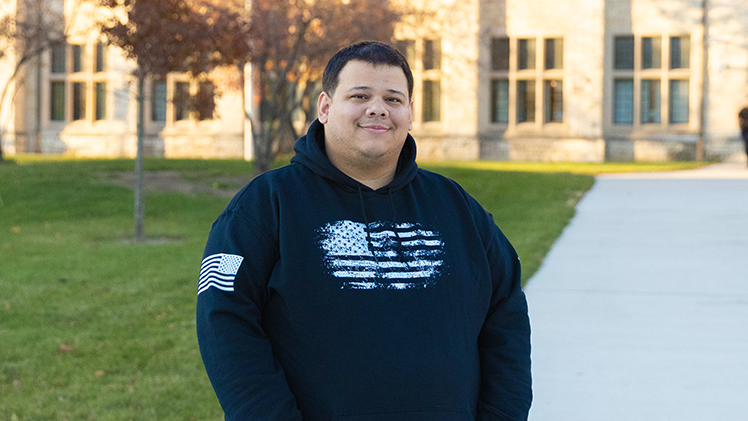Joshua Solis wants to help people.
“I decided to study social work because I wanted to be able to provide people with mental health resources and therapy,” Solis said. “I lost two close friends to suicide in 2017 and that made me want to pursue a degree in a field where I could help people who had those thoughts.”

As a nontraditional student who works as a healthcare provider at the Toledo Correctional Institution, Joshua Solis, 30, has come a long way has come a long way as he works toward his master of social work.
What started as a job for Solis turned into an important outlet for helping others.
“I am a behavioral healthcare provider at the Toledo Correctional Institution, where I have worked for the past nine years. I work with male maximum security inmates doing group and individual therapy,” he said. “Most of the inmates currently incarcerated will go home one day, and many are in need of mental health services. In my role, I am able to help them improve their mental health so that they hopefully lead a happier and more productive life after incarceration.”
At the age of 30, Solis has come a long way to earn his master of social work degree. He did not always know what he wanted to do, though.
“I was torn between wanting to be a high school history teacher and something in the law enforcement field, but I didn’t know where I wanted to fit in,” Solis said. “I dropped out at 19 and I didn’t return to college until I was 26. Back then, I didn’t know what I wanted to do, and that’s something a lot of people don’t realize; there’s so much more to life that you can’t plan out, because sometimes you don’t know what you want to be doing in 10 years.
“I fell into corrections because I was 20 and needed a job,” he added. “But as it turned out, I enjoy what I do now.”
Meredith Rinna, an associate lecturer of social work in the College of Health and Human Services, said she watched Solis grow as a person and student during his time studying social work.
“Driven by his personal experience and a deep sense of compassion, Josh made the courageous decision to pursue a career in social work after years as a corrections officer,” Rinna said. “He has become a committed advocate for providing behavioral health support to those in the prison system. His dedication to making a meaningful impact within this challenging environment is truly inspiring and his journey reflects the power of empathy and resilience in social work.”
Solis said one of the most important lessons he learned as a nontraditional student was to take his time in life.
“I went into college at 18 adamant that I was going to be a police officer. Then I thought I was going to be a pastor, or a high school history teacher, and then it went back to I wanted to be a cop,” he said. “Don’t think you have to go rushing in so quickly. Take time to experience what else is out there. Any field you go into, there’s a lot of different opportunities and places you can take it.”